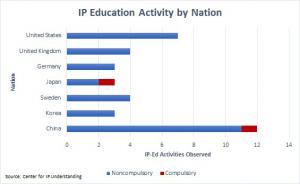Leading Nations Slow to Accept Non-Lawyer IP Education, Center for IP Understanding Finds
Persons outside of the legal profession remain largely under-served by intellectual property education activities among leading IP nations.
Although IP rights are more relevant than ever to the economies of leading nations, basic IP literacy is lacking.”
NEW YORK, NY, USA, March 15, 2018 /EINPresswire.com/ -- Despite the increased importance and value of intellectual property rights like copyrights, trademarks and patents, people outside of the legal profession, including high-school and college students, teachers and parents, remain largely under-served by IP education activities among the leading IP nations. — Manny Schecter, Chief Patent Counsel, IBM
“The State of Intellectual Property Education Worldwide: Seven Leading Nations,” a report released today by the Center for Intellectual Property Understanding (CIPU), an independent non-profit, examines the types of IP awareness programs available in the U.S., UK, Japan, Korea, China, Germany and Sweden, and their impact.
“Despite the incredible importance of intellectual property to the overall economy in both in the United States and abroad,” the report notes, “IP education remains largely the province of law schools. Although the idea of teaching IP-related subjects at the undergraduate level has grown more popular in recent years, there is still more work to be done towards introducing IP into course curriculum.”
While the several of the most IP-active nations have increased their education and awareness activities for non-lawyers, governments in those countries, except for Japan and China, have elected not to make them compulsory.
Despite increased emphasis on the STEM curriculum (science, technology, engineering and math), and growing role of IP rights, IP-Ed activities remain almost entirely voluntary. It is unclear if this is a result of inability of governments and educators to understand the important role IP rights play in innovation; investment and jobs; peoples’ lack of interest; anti-IP bias; or other factors.
Other key findings of the report include:
• Fewer than half of the countries examined have IP-related curricula for K-12 students
• Japan and China are the only nations where IP education is occasionally required
• China, the last to develop IP-Ed activities, has been adopting them fastest
• Top IP Index performers, US and UK, are also leading IP-Ed providers
“Delivery of IP education programs for the most part has not kept up with the emergence of the STEM curriculum,” said Manny Schecter, Chief Patent Counsel at IBM, a member of the board of directors of the Center for IP Understanding and President of the IPO Education Foundation.
“Although IP rights are more relevant than ever to the economies of leading nations, basic IP literacy is lacking. More pro-active education about the fundamentals of intellectual property is needed to ensure that students understand the importance of intellectual property to our economic well-being and the impact of routinely ignoring patents, trademarks and copyrights.”
For the complete report, “The State of Intellectual Property Education Worldwide: Seven Leading Nations,” go here.
About the Center for IP Understanding
The Center for Intellectual Property Understanding (CIPU) is an independent non-profit organization dedicated to increasing awareness of intellectual property rights and their impact on people’s lives. The Center holds events, provides outreach, partners with other organizations and provides an education framework for IP to facilitate ideas, promote competition and create jobs. For more information visit www.understandingip.org.
Bruce Berman
Center for IP Understanding
212.508.9664
email us here
Legal Disclaimer:
EIN Presswire provides this news content "as is" without warranty of any kind. We do not accept any responsibility or liability for the accuracy, content, images, videos, licenses, completeness, legality, or reliability of the information contained in this article. If you have any complaints or copyright issues related to this article, kindly contact the author above.


